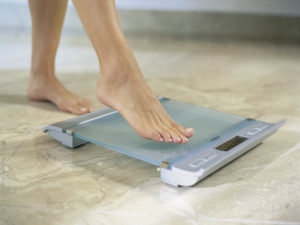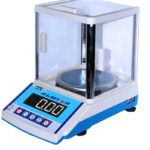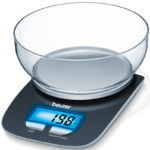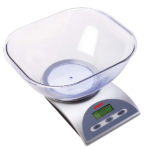 Many of us are familiar with the situation when the numbers on a floor electronic or mechanical scale jump at best by a pound up or down, if you rearrange them to another place or accidentally move them. It even happens that the device remains in the same place, and a person suddenly “loses weight” or “gets better” in just a couple of minutes. Inaccurate and unstable readings of the device can prettyly ruffle nerves. Whether this can be avoided, and which scales are the most accurate - electronic or mechanical, will find out in this article.
Many of us are familiar with the situation when the numbers on a floor electronic or mechanical scale jump at best by a pound up or down, if you rearrange them to another place or accidentally move them. It even happens that the device remains in the same place, and a person suddenly “loses weight” or “gets better” in just a couple of minutes. Inaccurate and unstable readings of the device can prettyly ruffle nerves. Whether this can be avoided, and which scales are the most accurate - electronic or mechanical, will find out in this article.
Content
The principle of operation of floor scales
There are only 2 fundamentally different types of floor standing weighing instruments: either they are mechanical or electronic scales. Measurement occurs when a person stands on the platform. In the spring device, the result is shown by an arrow on the dial, and in the automatic - on the digital display.
If you look at the spring scales from the inside, you can see 4 legs in the corners of the platform that interact with four pairwise intersecting levers. When pressure is applied to the body, levers distribute it as if it is evenly distributed over the entire platform. Two long levers are connected to a platform, which in turn is connected to a simple but very accurate spring, which is stretched under the action of force.
The body weight is distributed between four points on the scale, and the levers transmit it to the spring in a ratio of 12: 1. The magnitude of the stretch is transmitted using a smaller spring, called a spring cable, to the gear, which moves the arrow along the dial. And so, if a person’s body weight is 60 kg, then only 5 kg will pull the spring down. Without such a distribution, the spring would have to be huge.
Measurement accuracy is tied to the division price on the scale. It is almost never less than 100 g, therefore, for mechanical scales, this accuracy value is the limit.
The heart of the electronic scale is a strain gauge. A resistor is an electrical element that has a known resistance value. Resistance, in turn, is the property of metals and other conductors to prevent the passage of electric current through them. The ability to “resist” depends on certain conditions and may vary. The resistance of the strain gauge varies depending on how much it is deformed. It looks like a conductor folded with an accordion. It can be foil or wire. When the load cell is under pressure, it stretches, increases in length and decreases in cross section, and this increases its resistance.
In the simplest models of electronic scales, a plate acts on the strain gauge, the same as in mechanical scales, which is deformed under the influence of the same levers. The most common type of floor electronic scale is with load cells in the legs. The total resistance is measured, data is fed to the board and displayed on the screen.
An even more complex device of expensive electronic scales is based on the principle of operation of a capacitor. In its design there is a pair of metal disks, one of which moves under the pressure of body mass. The distance between the disks decreases, therefore, the capacitance of the capacitor decreases. The resulting capacity indicator is converted to kilograms and displayed on the screen.
The most sophisticated models have a built-in memory card for generating reports on weight dynamics, functions for measuring fat, muscle and bone mass, control via an external device (such as a smartphone), show body mass index. Such a device will show not just the number of kilograms, but the percentage of fat and water, which will allow you to analyze changes in the body in more detail. Such a miracle of technology is beyond the power of mechanical scales.
Advantages and disadvantages of scales of different operating principles
The table helps to compare two types of devices. Both species have the same number of advantages and disadvantages that cancel each other out.
| Benefits | disadvantages | |
| Mechanical |
|
|
| Electronic |
|
|
How to choose a bathroom scale
There are just a few criteria that you need to pay attention to when choosing a home scales.
- Price.
As with any other product, the price / quality ratio also works for floor scales. But what is the difference in accuracy and reliability between weights of 10, 100 and 1000 conventional units and is it worth it? The logic is understandable when the price and characteristics differ. But the buyer is lost when he sees the same parameter values, and the cost differs by an order of magnitude. Instinctively, it seems that a more expensive product is better and more reliable, however, with regard to instruments for measuring body weight, you can trust the characteristics and not go on about brands and names. - Measurement accuracy.
Mechanical household floor scales are never more accurate than digital. An exception is perhaps medical mechanical scales. In most cases, the error in household appliances is the same - about 100 grams. However, more expensive electronic scales carry out much more accurate measurements. - Weight Limit.
Household appliances have a range of maximum permissible values from 120 to 180 kilograms. Even if you do not weigh so much and are sure that you will not, it is better to purchase the device that has the largest margin. This means that he will not work to the limit, and therefore will last longer. - Additional functions.
Body weight says little about his condition. Two people with the same weight can look completely different depending on the ratio of fat and muscle tissue. Therefore, the function of measuring fat is useful and informative. And the ability to compile reports and graphs of the dynamics of the mass of talis will appeal to methodical analysts.
Who won?
We conclude: household mechanical scales are suitable for those who are not interested in anything but measuring body weight. They are sold at an affordable price and perfectly perform their functions without requiring battery replacement. For such purposes, it does not matter which type is preferred. But if you want to know more, the digital device provides a huge set of possible functions. They will become the best assistant in working on the body of your dreams.



